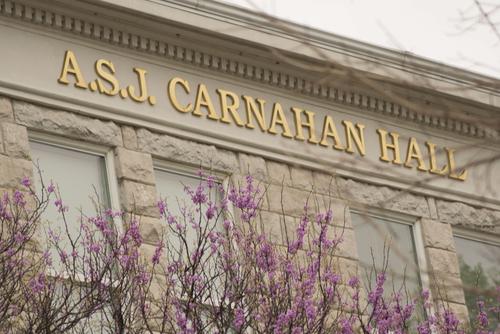Criminal Justice Online Master's Degree
Continue to main content
Online: Criminal Justice Master's Degree Map
This is where you find your fearless.
The online graduate program in criminal justice admits students throughout the year.
- An undergraduate GPA of 2.5 or higher on a 4.0 scale
30 hours required
Core Requirements
- CJ600 Administration of Justice (3)
- CJ601 Applied Research (3)
- CJ615 Theories of Crime (3)
- CJ626 Applied Analytics (3)
Choose 18 hours from the following; at least 3 hours must be at the 600 level:
- CJ505 Social Inequality (3)
- CJ510 Comparative Criminal Justice Systems (3)
- CJ519 Restorative Justice (3)
- CJ520 Law and Social Control (3)
- CJ522 Critical Analysis of Gangs in America (3)
- CJ540 Professional Standards (3)
- CJ541 Death Penalty in America (3)
- CJ602 Professional Development Planning (3)
- CJ610 Seminar in Law Enforcement (3)
- CJ630 Contemporary Juvenile Justice (3)
- CJ635 Civil Law and Liability (3)
- CJ645 Criminal Justice Policy Analysis and Evaluation (3)
- CJ650 Criminal Justice Leadership and Practice (3)
- CJ651 Special Topics in Criminal Justice (3)
- CJ680 Travel Study (3)
- CJ690 Professional Praxis (9)
- CJ691 Independent Study in Criminal Justice
- CJ699 Criminal Justice Internship (3-6)
Comprehensive Portfolio compiled during the course of study and
completed during the final semester, and students must enroll in GR698
during their final semester of coursework. The required Portfolio must be
successfully completed prior to degree conferral and includes one
comprehensive item from each graduate course taken, designated by
the respective instructor of each course in the student’s program of
study. Successful completion of the MSCJ Portfolio requires a
comprehensive average minimum score of 80% across all portfolio
items prior to degree conferral.
National Academy; Federal or State Special Agent School; or equivalent
senior/executive-level training may receive 9 hours credit in CJ 690
toward MSCJ degree requirements. PLC in other areas also may be
awarded. All PLC counts toward the maximum allowable 12 hours of
graduate transfer credit that may be applied toward MSCJ degree
requirements.
Our graduate course descriptions can be found on the Graduate Courses page. This page lists all graduate courses including criminal justice courses with their details to help you plan your studies.
The Criminal Justice Department offers courses on a two-year rotating schedule. To see when each graduate course is available (spring, fall, first 8 weeks, second 8 weeks, or online), please check the Criminal Justice Graduate Course Rotation. This will help you plan when to take your classes.
Access, Convenience, and Flexibility
-
100%
Online Graduate Courses
100% online courses allow you to work and study at a time and location convenient for you, making Southeast the best online criminal justice master's program for you.
-
8
Week Courses
8-week online criminal justice courses reduce your time away from work or family and shorten your time to graduation.
-
0
GRE or Thesis Requirement
The Online Criminal Justice Master's program does not require a GRE or Thesis for completion.
-
9
Credit Hours
9 credit hours for advanced or executive level training help you complete your degree in 12 months or less.
What will it cost?
Missouri National Guard Criminal Justice
Your path to a serious career starts here. MONG provides real support for students committed to criminal justice. We bridge academic training with hands-on experience, offering educational benefits that turn your goals into reality. Earn while you learn.
SEMO Blog
Check out our blogs and learn what makes SEMO's Criminal Justice programs stand out! Our expert teachers bring real-world experience to your classes. Read stories about our faculty and discover how they're helping students like you prepare for exciting careers in law enforcement and criminal justice!
Chair & Professor in the Department of Criminal Justice, Social Work and Sociology
"What makes our program special is how it focuses on practical skills you can use right away to help you solve real problems every day. We also recognize the value and award degree credit for prior learning, whether from the FBI National Academy or other high-level training, and I'm proud that we've built something where you can grow professionally without missing family time or stepping away from your career."
Brian Donavant Ph.D.

Accelerated Master’s Degree
Southeast offers an accelerated master’s degree for current students. If you want to complete your M.S. in Criminal Justice sooner, contact the department for more information.
Earn Your Degree on Your Schedule.
Do more than dream about the future. Take the first steps to make it all happen.
Getting the Job
Your education is just one piece to launching an extraordinary career. Once you’ve mastered the material, you still have to find the job you want, make the right connections, and sell your knowledge and experience—if all this is giving you anxiety, don’t panic. SEMO’s Career Services office is here to help you with the next step. Our boldly supportive faculty will provide the expertise and support you need, so you’re landing your dream job in no time.
Criminal Justice Online Master's Degree Outcomes & Careers
-
$97K
Emergency Management Directors
According to the Bureau of Labor Statistics the median annual salary for emergency management directors is $97,700.
-
$82K
First-Line Supervisors of Correctional Officers
According to the Bureau of Labor Statistics the median annual salary for first-line supervisors of correctional officers is $82,260.
-
$98K
Detectives and Criminal Investigators
According to the Bureau of Labor Statistics the median annual salary for detectives and criminal investigators is $98,770.
College of Humanities and Social Sciences
This degree is housed within the College of Humanities and Social Sciences. The College prepares students for lifelong careers. We boast programs that train students in problem-solving, critical thinking, communication, organization, and adaptability. Skills employers value, so we prepare you for basically any career field.
U.S. News & World Report
"Southeast’s online criminal justice graduate program was slated as the 48th best in the nation and the best in the state."
“ Graduating from the criminal justice program has helped shape me into the state trooper I am today. Even now, coming up on three years as a state trooper, I am constantly going back to my time as a graduate student and dissecting and learning from everyday situations. ”
Online Learning at SEMO
When it comes to your success, we do whatever it takes. Online learning at SEMO takes the same reputable college courses taught by Southeast faculty and makes them available anytime, anywhere.
Your Success, Our Priority
Got questions? Our faculty are here to help! Whether you're trying to pick the right major, need career advice, or want to understand more about our programs, we're just an email or call away. No question is too big or small – we're your personal roadmap to success.
Additional Resources
Cape Girardeau, MO 63701


